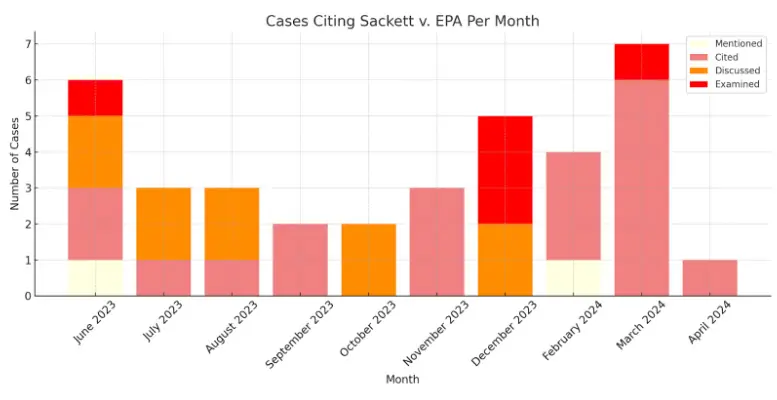How has Sackett v. EPA affected your local regulations? Explore our interactive StoryMap.
May 25, 2024 marks the anniversary of the Sackett v. EPA decision that profoundly narrowed the definition of Waters of the United States (WOTUS) and limited federal wetland protections. The concept of WOTUS was coined 35 years ago and has been in flux ever since, but last year’s decision brought an unprecedented level of finality and restriction, significantly limiting federal oversight—overwhelmingly to the detriment of environmental health.
According to White House Council on Environmental Quality (CEQ) Chair Brenda Mallory, this ruling represents “one of the largest judicial rollbacks of environmental protections in U.S. history.” It has effectively stripped federal protection from ephemeral and unconnected waters, constraining the EPA and U.S. Army Corps of Engineers’ ability to oversee and enforce wetland regulations, in spite of protests from officials that this limitation ignores the science around the ecological importance of those water features.
Responses and Initiatives
The decision has been met with substantial criticism from federal agencies including representatives from the Corps, EPA, and CEQ, with officials advocating for innovative approaches to overcome lost protections. An internal memo from the Army Corps’ Assistant Secretary of the Army (Civil Works) Michael Connor in March, and recent talks by CEQ Chair Mallory have called for creative workarounds and solutions for bolstering environmental protections to make up for the severely limited policy.These addresses have underscored the need for resilience and adaptability in water management strategies, reimagining water protection by utilizing every tool and resource at all government levels to protect our nation’s waters.
Solutions to Overcome Policy Limitations
In light of the scaled-back federal oversight, Mallory and Connor have proposed workarounds including:
- Cooperative Agreements with States: States can enact stricter environmental protections, especially those who face unique water-related challenges like increased flooding. 15 states already have broad water policies beyond WOTUS, and eight more have more limited water policies. The remainder are reliant on WOTUS protections at the federal level. Learn more in the interactive StoryMap, “How does SCOTUS’ Sackett v. EPA Decision Affect You?”
- Conservation Agreements with Private Parties: These partnerships can promote sustainable practices.
- Incentives for Sustainable Development: Encouraging more sustainable land use and development practices through financial incentives.
- Protective and Mitigation Actions: Strategies include Aquatic Ecosystem Restoration; Technical Assistance Programs that support development of water-related programs or regulations like watershed and restoration planning assistance; integration of nature-based solutions into Civil Works project planning, design, and construction; and support compensatory mitigation for impacts to WOTUS. Read more in Connor’s memo.
Ongoing Litigation and Legal Challenges
There is ongoing litigation challenging how the Sackett ruling has been interpreted by the EPA and the Army Corps, with cases in Texas, North Dakota, and North Carolina arguing that recent regulatory revisions remain arbitrary. The outcome of these cases could clarify the scope of federal environmental oversight further. Since May 2023, Sackett has appeared in subsequent cases a total of 39 times: examined in five, discussed in 10, cited in 23, and mentioned in one.

The Road Ahead
Experts predict that agency responses may shift from proactive jurisdictional determinations to reactive enforcement measures, focusing on significant violations. The definitive nature of the Sackett decision suggests lasting impacts, yet future legal and political developments—such as election outcomes—could influence its interpretation and implementation.
Overall, while the Sackett v. EPA decision has set a new precedent, the dialogue it has initiated among policymakers, legal experts, and environmentalists is likely to spur ongoing debates and potentially pave the way for new legislative and regulatory adjustments. As we navigate these changes, the collective effort toward sustainable water management remains more critical than ever.
Read more: Ecobot spoke with D.C.-based environmental attorney and WOTUS expert Fred Wagner about this first year in a post-Sackett regulatory landscape. Learn Wagner’s insights on current and pending legislation, predictions for the future, and what it would take to swing the pendulum back toward favorable wetland protections.



